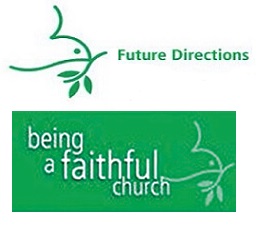About 500 Mennonites from across Canada will gather in Saskatoon, Saskatchewan, July 6 to 10, 2016, for the Mennonite Church Canada Assembly. This event, which happens every two years, brings together people for worship, fellowship and to make decisions for the national church. (See here for the schedule, documents, and a video.)
In case you’re wondering: the congregations of Mennonite Church Canada (MC Canada) are organized into five regional Area Churches: Mennonite Church British Columbia (MCBC), Mennonite Church Alberta (MCA), Mennonite Church Saskatchewan (MCSask), Mennonite Church Manitoba (MCM), and Mennonite Church Eastern Canada (MCEC).
Delegates from MC Canada’s congregations and the area church delegates will discuss topics that are important to the life of the church in Canada. You can learn about the key decisions by reading the documents in the Assembly 2016 “Discernment Guide,” which is available for download. You can watch the worship and plenary sessions via livestream. See the Assembly schedule. (Remember that it’s based on Saskatoon time.)
These discussions are on the agenda:
Being a Faithful Church discernment
Mennonite Church Canada began the Being a Faithful Church (BFC) discernment process in 2007, due to ongoing discussions about committed same-sex relationships. There were requests that the church re-consider the Resolution on Human Sexuality, adopted in Saskatoon in 1986.
In their summary of this discussion between 2009 and 2015 (Being a Faithful Church 7), the BFC task force reported that they have learned that churches in Canada are holding two sets of values that are sometimes in tension. They report, “We deeply value unity and we also value diversity and forbearance even when it leads to differences among us as we seek to be faithful to our understanding of God’s will.” The BFC task force also recognizes that sometimes the dissenting voice is “a prophetic nudging of the Spirit to the entire church,” and so it is important to provide space in the church for testing to see if new voices are from God.
The BFC task force recommends to the Delegate Assembly that the Confession of Faith in a Mennonite Perspective (published in 1995) continue to be used by the church “in the ways suggested in the Introduction of the Confession itself.” At the same time, they ask the church to acknowledge that some congregations and individuals have studied the Scripture and have prayerfully discerned “a different understanding on committed same-sex relationships than is commonly assumed by readings of Article 19 in the Confession of Faith in a Mennonite Perspective.” The BFC task force is recommending that “we create space/leave room within our Body to test alternative understandings from that of the larger Body to see if they are a prophetic nudging of the Spirit of God” and that “Mennonite Church Canada and Area Churches develop a mechanism to monitor the implementation of this recommendation.”
The BFC document begins on page 4 of the “Discernment Guide.”
Assembly discussions on Being a Faithful Church will happen on Thursday afternoon (July 7), with the report from the Task Force at 2:15 p.m. MDT, followed by table discussions and feedback. The vote on BFC is scheduled for Saturday (July 9) at 9:00 a.m. MDT. See the livestreaming here.
Future Directions Task Force revised recommendations
The Future Directions task force began its work in November 2012, with the assignment to consider what God’s Spirit is calling Mennonite Church Canada to in the twenty-first century and how the church can best organize itself to thrive and grow. There seemed to be a growing reality that present programs in the church were not sustainable. In late 2015 the task force released its summary report, which was discussed at each of the five area church delegate sessions in 2016.
Although the area churches responded positively on the whole, enough critique came from these discussions that the task force prepared an Addendum to its report in May, 2016, with additional recommendations. (The Future Direction documents begin on page 8 of the “Discernment Guide.”)
While the Future Directions task force tried to get the conversation going earlier, most of it happened after the final report was released. The task force recommends that there be ongoing consultation throughout the church, with the opportunity for a vote on a more fully developed proposal by July 2018.
To recognize the concern that the proposed model might lead to strong regionalism and the end of a national church identity, the task force recommends that the final structure involve some form of “area church delegate involvement in the governance of national agenda and priorities.” They also recommend national gatherings for study, fellowship, worship and discernment.
Because there was considerable push-back to the idea that Mennonite Church Canada should concentrate on local witness work rather than long-term international assignments, the task force recommends that there be a formal review of “our future vision and strategy for international relationships and witness” by December, 2017.
There is concern that some area churches are small and could be vulnerable without strong support from the broader church. For this reason the task force recommends that the final proposal have provisions make small area churches less vulnerable.
The final concern expressed in the Addendum is the question of sustainability, both financial and emotional. For this reason the task force recommends a formal conversation that engages congregations to dream and think creatively about how to “live out the gospel of Christ locally, across Canada and abroad,” how to best work together to be the church, and how to “generously support our mutual ministry.”
The General Board has agreed to add these provisions to the Future Directions report so that these concerns are included in the motion that will come to the delegates. The recommendations will be discussed at the delegate assembly in Saskatoon in both workshops and in plenary sessions.
Friday (July 8) is the day for Future Directions discussion, beginning with the report at 9:00 a.m. MDT, followed by table discussions and feedback. The vote on Future Directions recommendations is scheduled for Saturday morning (July 9), at 11:00 a.m. MDT. See the livestreaming here.
Two resolutions
Delegates to Saskatoon 2016 will be invited to respond to two resolutions brought to the assembly.
The Church and the Doctrine of Discovery (DOD) (p. 25 in the “Discernment Guide”) was created in the fifteenth century and still serves as a legal document that supports a worldview of oppression. In Call to Action #49, Canada’s Truth and Reconciliation Commission (TRC) calls upon “all religious denominations and faith groups who have not already done so to repudiate concepts used to justify European sovereignty over Indigenous lands and peoples, such as the Doctrine of Discovery and terra nullius.” The recommendation relating to the DOD asks the Mennonite Church in Canada to repudiate the DOD and work toward implementing other aspects of the TRC’s final report that uphold indigenous rights.
This resolution is co-sponsored by the executive board/councils of all five area churches, 12 MC Canada congregations, and one group of individuals.
The Resolution on Palestine and Israel (p. 28 in the “Discernment Guide”) was brought by Byron Rempel-Burkholder after he and his wife Melita spent a few months in short-term ministry at Bethlehem Bible College in Palestine. This resolution approaches another historic justice issue and comes “in response to the plea of Palestinian Christians that the global church come alongside the Palestinian people as they suffer under Israel’s 49-year military occupation of their lands: the West Bank, East Jerusalem and Gaza.” In a blog post https://byronandmelitainpalestine.wordpress.com/2016/06/08/taking-action/ sharing their experience, the Rempel-Burkholders state: “We lament that many Mennonites still support a traditional stance of unqualified support for the state of Israel (influenced largely by Christian Zionism and a particular eschatology), even while contributing generously to charitable and development work in Palestine for almost 70 years.” (Here's more background on this resolution.)
To learn more about Assembly 2016, see:
Assembly 2016 bits and pieces
Assembly 2016 speakers to focus on God’s covenant








Leave a Reply
You must be logged in to post a comment.